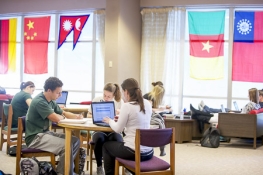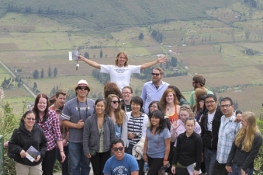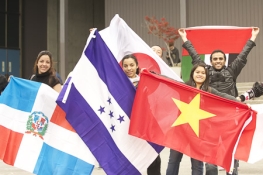Major & Concentrations
The world’s biggest challenges are interconnected and the Cal Poly Humboldt International Studies Program helps students remain rooted in the community while becoming agents of change in the world.
When you undertake a degree program in International Studies at Cal Poly Humboldt, you develop a deeper understanding of the global issues that shape our world.
Our interdisciplinary Bachelor of Arts degree includes four distinct components
- Core Curriculum
- Language Proficiency
- Residency Abroad; and
- Regional/Issue Expertise
Concentrations
As part of your degree you will also choose an area of Concentration. We have 5 Concentrations consisting of 3 regions and 2 issues.
Regional Concentrations
- Chinese Studies: This concentration provides a breadth of knowledge and direct experience of Chinese culture and society. It is appropriate for those whose future plans will require considerable cultural competency.
- European Studies: This Concentration (with an emphasis in either France, Germany, Spain, or a combination) provides language and cultural skills necessary to work in European history, politics, culture, and economy. An emphasis on language acquisition and time spent abroad give students direct experience with the societies of Europe.
- Latin American Studies: This Concentration enables students to explore diverse areas of study related to the region, including anthropology, archaeology, art, dance, economics, film, geography, history, language, literature, music, politics, and popular cultures. This Concentration also provides a basic foundation for graduate work in Latin American Studies.
Issue Concentrations
- Cultural Studies: This Concentration focuses on the diverse forms of transnational cultural production (musical, literary, filmic, artistic) that characterize the modern era. Students study the historical relationship between culture and imperialism, the forging of new national cultures in the post-colonial Global South, the emergence of border and diaspora cultures, and the many other forms of culture that circulate and cross-pollinate across global routes.
- Development Studies: This Concentration focuses on cross-disciplinary exploration of issues pertinent to developing countries. This concentration will appeal to students interested in careers with governmental and non-governmental organizations engaged in development. Humboldt and the International Studies Program is one of the largest feeders to the Peace Corps for schools of our size and this Concentration often provides useful preparation.
Catalog Information
Coursework
Working closely with your faculty advisor, you will plan your classroom education and time overseas based on your personal interests. Your core coursework will give you a framework for understanding the cultural, political and economic forces behind the processes of globalization that affect virtually every aspect of modern life. Your concentration area coursework will lead you to different departments, disciplines and professors across campus as you gain a regional or an issue expertise.
The International Studies capstone will give you the opportunity to bring these different elements together to build a career and an academic portfolio as well as a final project of your own creation.
We teach Spanish, French, and German at Humboldt to varying levels. You may use any of these for your International Studies degree as we require proficiency or the equivalent of 4 semesters of college language. However, if you are already proficient in a second language, the language faculty can help you establish your proficiency and it can be used for your degree. Alternatively, if you would like to learn a language we do not teach at Humboldt you can use a year abroad to gain proficiency in that language (1 semester abroad counts as 2 semesters on campus).
Finally, International Studies requires two experiential/practical classes that include the International Education Week Colloquium and a Career Workshop. These classes offer students the opportunity not only to explore their many career options but to meet those already working in these fields.
A degree in International Studies will offer you
- the ability to analyze regional and global issues from economic, political, and cultural perspectives;
- linguistic competency in a second language;
- cultural competency in diverse international environments;
- the ability to gather information and use interdisciplinary analysis skills to critically evaluate regional and global issues;
- proficiency in formal written and oral communication; and
- the skills you need to build an international career.
International Studies Research Guide
In this guide you will find links to global media with current headlines and newspaper search engines so you can find local, regional or foreign press to keep up on international issues (or practice your language skills). The other pages in this guide are primarily designed to help you find your way around the library, especially the resources most relevant to your International Studies degree.












